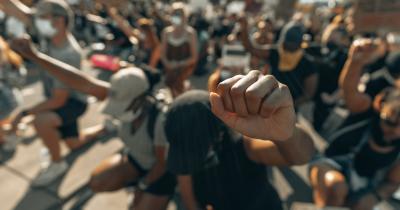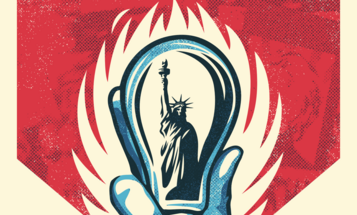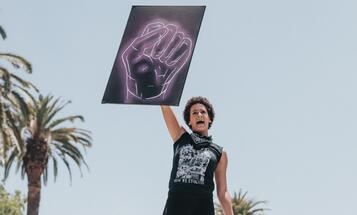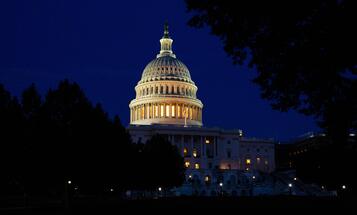
Uprising
The ongoing devaluing of Black life that’s now on full display forces us to confront America’s racist origins and to uproot our systems of racial violence, economic subordination, and hoarding of political power.

In the weeks since the murders of George Floyd, Breonna Taylor and Ahmaud Arbery, tens of thousands of Americans, led by Black communities and Black-led organizations, have taken to the streets to demand an end to the racist killings of Black folks and the systemic violence that our governments, our politics, our economy, and our society continue to unleash on Black communities.
We are in a historic moment of rupture, firmly planted in a catastrophe of racist, anti-Black violence, layered on top of a pandemic and economic collapse
We are in a historic moment of rupture, firmly planted in a catastrophe of racist, anti-Black violence, layered on top of a pandemic and economic collapse that has disproportionately impacted Black, brown, and Indigenous communities. This confluence of crises is compounded by the tragic failures of our political institutions, which are incapable of assuring the basic safety and security of Black people in particular.
The fight we are facing makes clear why basic demands for physical safety from attacks by the state and vigilantes, protection from a pandemic virus, and access to basic goods like shelter, health care, food, and child care are so hard to realize. Systems of racial violence and inequity persist because they uphold centuries of white supremacy and social hierarchy that benefit white communities, corporations, and politicians.
Corporations are now loudly proclaiming Black Lives Matter, while at the same time forcing Black and brown workers to go back to work in the middle of a pandemic that threatens their lives. Elected officials are voicing their support for the protests, when so many of them—Democrats and Republicans—have systematically defunded our public infrastructures of health, education, and environmental safety, while lavishing generous resources on police, military, and immigration enforcement officials, adding to the crisis of unchecked state-sponsored violence on people of color.
Despite the depth of suffering and the rising voices of people protesting on the ground, political and economic elites are mobilizing to suppress our demands and further concentrate power
And despite the depth of suffering and the rising voices of people protesting on the ground, political and economic elites are mobilizing to suppress our demands and further concentrate power by dismantling our democratic institutions. The militarization and escalation of the police response to the protests—egged on from the White House—represent an assault on the democratic principles of free speech, association, and bottom-up people power. Even now, Republicans are moving to delegitimize and defund critical infrastructure—such as the U.S. Postal Service—that we will need to assure a fair and safe election in November.
We are obligated to attack racism wherever we see it, or we are complicit.
The ongoing devaluing of Black life that’s now on full display is forcing us to confront America’s racist origins and interrogate the role that white people and non-Black people of color play in perpetuating the systems and norms that obstruct the liberation of Black people. We are obligated to attack racism wherever we see it, or we are complicit. So are we obligated to uproot the systems of racial violence, economic subordination, and the hoarding of political power if we are serious about building a truly free and inclusive democracy that so many of us hope is possible.
At Demos we are meeting this moment by:
- Working closely with Black-led organizations in the states and in national coalitions to support the critical and increasingly dangerous work of protesting and organizing;
- Bringing together our partner organizations to imagine and explore what an inclusive and liberated future for Black people looks like, and mapping what it would take to get there;
- Advancing the bold, transformative ideas that are rooted in experiences of Black, Indigenous and people of color to bring about durable structural reforms to our country’s voting systems and economic institutions;
- Leveraging our relationships with policymakers, funders, and other people who hold power to push them to take bolder action in this critical moment.
Following the lead of the Movement for Black Lives, we join the demands for radical transformation of our country, because anything less is unacceptable.
- First, we must immediately end the war on Black communities by dismantling and defunding state infrastructures of racial violence: police, prisons, immigration enforcement.
- Second, we must move from an economy of extraction to one of liberation—institutionalizing reparations for past and current harms, redirecting public investments into the provision of public goods like housing, health care, and environmental safety, and reimagining the safety net—in ways that benefit and include Black, brown, and Indigenous communities that have been systematically excluded from our historical social contract.
- Third, we must break up the concentrations of financial, economic, and corporate power that perpetuate and profit from our racially-extractive and exclusionary economy, by reining in private equity and finance, imposing tough limits on corporate power, and dismantling the new corporate overlords like Amazon.
- Fourth, we must reimagine our political institutions to center the voices of the most affected communities, and in particular to ensure the political power of Black communities. That means ensuring an equitable and inclusive election and ending voter suppression. It also means protecting the right to protest and associate, free of intimidation by official or vigilante white supremacist organizations. And it means knocking down the constitutional structures that concentrate political power in white communities and prevent the emergence of a truly inclusive multiracial democracy: the Electoral College, the Senate filibuster, and the denial of statehood for Washington, DC and independence for Puerto Rico and the territories. Finally, it also means institutionalizing direct community control over daily economic and social policy decisions: from housing to water to public safety, Black and brown communities and working families should be the ones directly empowered to decide public policy.
We call on you to join the movement to transform our country, finally dismantle these deep systems of anti-Black violence and oppression, and help usher in a truly inclusive democracy.




